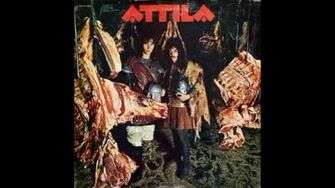| Attila | |
|---|---|
 | |
| Background information | |
| Origin | New York, New York, USA |
| Genres | Psychedelic Rock, Acid Rock, Progressive Rock, Heavy Metal |
| Years active | 1969 - 1970 |
| Labels | Epic, CBS/Sony |
| Associated acts | The Hassles, The Lost Souls, Billy Joel |
Attila was a short-lived heavy psych duo based out of New York City, formed in 1969 by Billy Joel and Jon Small. The band performed keyboard-driven heavy psych with elements of progressive rock and heavy metal. The band only released a single album in 1970 before disbanding, with Joel embarking on a successful solo career. Notably Joel put his keyboards through amplifiers and used keyboards to fill in bass in a similar style to Ray Manzarek (The Doors).
History[]
Prior to Attila's formation, Joel joined The Echoes, a group that specialized in British Invasion covers. The Echoes began recording in 1965. Joel (then 16) also played piano on several records released through Kama Sutra Productions and on recordings produced by Shadow Morton. Joel played on a demo version of "Leader of the Pack", which became a major hit for the Shangri-Las. Joel states that in 1964 he played on a recording of the Shangri-Las' "Remember (Walking in the Sand)" but he is unaware of whether he played on the demo or master version. The released single included a co-producer credit for Artie Ripp, who later was the first to sign and produce Joel as a solo artist after Michael Lang, who had given Joel a monetary advance, passed Joel along to Ripp to focus his attentions elsewhere.
In late 1965, the Echoes changed their name to The Emeralds, and then to The Lost Souls. Joel left the band in 1967 to join The Hassles, a Long Island group that had signed with United Artists Records. Over the next year and a half, they released four singles and two albums (The Hassles and Hour of the Wolf), none of which were commercially successful. Joel and drummer Jon Small left the Hassles in 1969 to form the duo Attila, releasing an eponymous debut album in July 1970. Its cover featured Joel and Small wearing viking garb, surrounded by hanging meat. There were no singles and the album failed to chart in any capacity. The duo disbanded the following October when Joel began an affair with Small's wife, Elizabeth. The pair later married. Despite this the two would still collaborate on occasion, as Small produced Joel's Концерт video as well as the Live at Shea Stadium performance.
Retroactively the album has been lauded with AllMusic going so far as to call it one of the worst rock albums of all time. Joel himself even referred to the album as "Psychedelic Bullshit".[1] In an interview via Dan Neer in 1985, Joel would talk about Attila in the following statement:
End of the sixties, I was in a two-man group. We were heavy metal, we were going to destroy the world with amplification, we had titles like "Godzilla", "March of the Huns", "Brain Invasion". A lot of people think [I] just came out of the piano bar... I did a lot of heavy metal for a while. We had about a dozen gigs and nobody could stay in the room when we were playing. It was too loud. We drove people literally out of clubs. "It was great, but we can't stay in the club."
Following the disbandment of Attila, Joel would lead a commercially successful career as a solo artist since the 1970s, having released twelve studio albums from 1971 to 1993 as well as one studio album in 2001. He is one of the best-selling music artists of all time, as well as the sixth best-selling recording artist and the third best-selling solo artist in the United States, with over 150 million records sold worldwide. His 1985 compilation album, Greatest Hits Vol. 1 & 2, is one of the best-selling albums in the US. Notably an Attila song, "Amplifier Fire, Part 1 (Godzilla)," appears on Joel's 2005 boxed set My Lives.
Discography[]

Attila (Billy Joel) - Self Titled Album (1970) COMPLETE
- Atilla (Studio Album) (1970, Epic)
Members[]
- Billy Joel - Keyboards, Vocals (1969 - 1970)
- Jon Small - Drums, Percussion (1969 - 1970)
